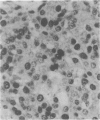Abstract
One hundred and sixty-three breast carcinomas occurring in women aged between 26 and 44 years were examined for pathological features, oestrogen and progesterone receptor status, proliferation as determined by Ki-67 labelling and the presence of c-erbB-2 and p53 protein, and were compared with a control group of carcinomas from women in the 50-67 years age group. Carcinomas occurring in women aged under 35 years had a significantly high incidence of being poorly differentiated and of having high proliferation rates. This group also had a significantly high incidence of p53 protein staining. Carcinomas in the under 30 years age group had a lower incidence of oestrogen and progesterone receptor positivity. No differences were found in c-erbB-2-positive staining between the groups. Infiltrating lobular carcinomas were only identified in women aged 40 years and over. There was a higher incidence of a family history in the 35-44 years age group (18%) than in the under 35 years age group (11%). Breast carcinomas occurring in women aged under 35 years are more aggressive. An important finding is the high incidence of p53 positivity, which may indicate genetic instability.
Full text
PDF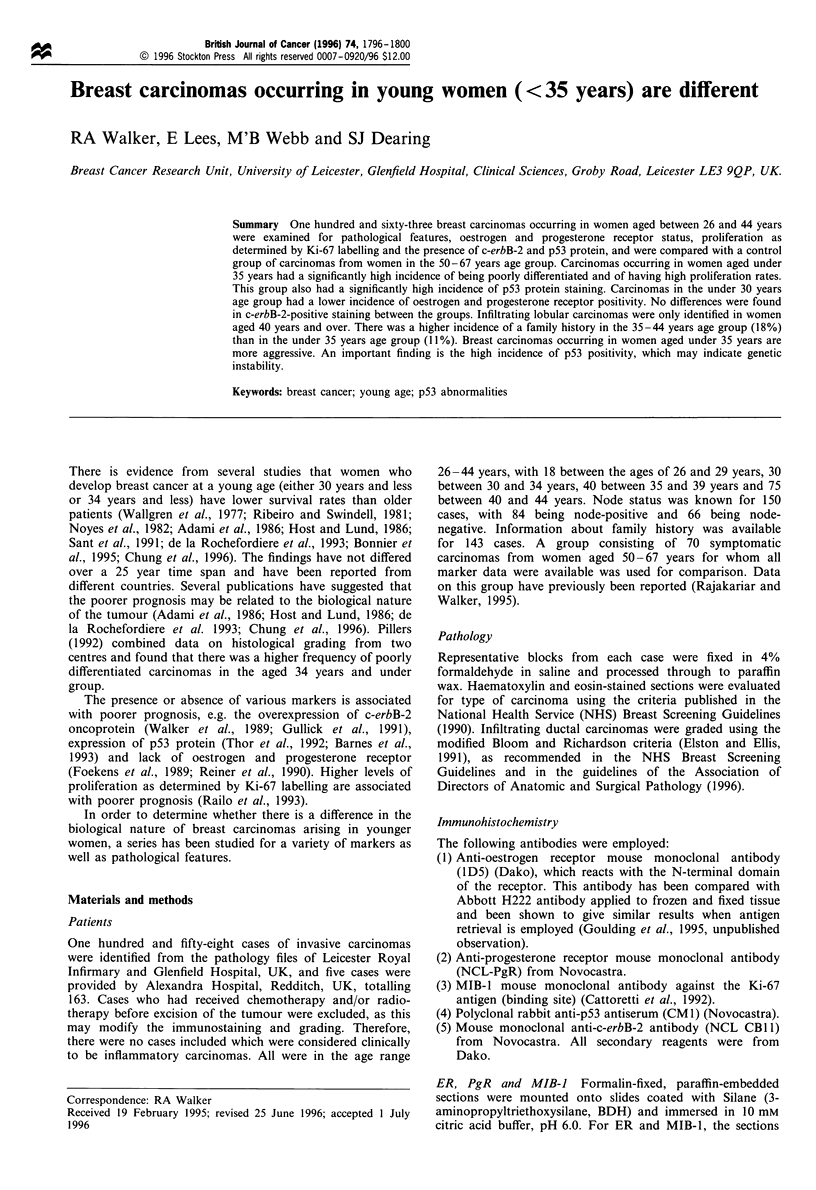
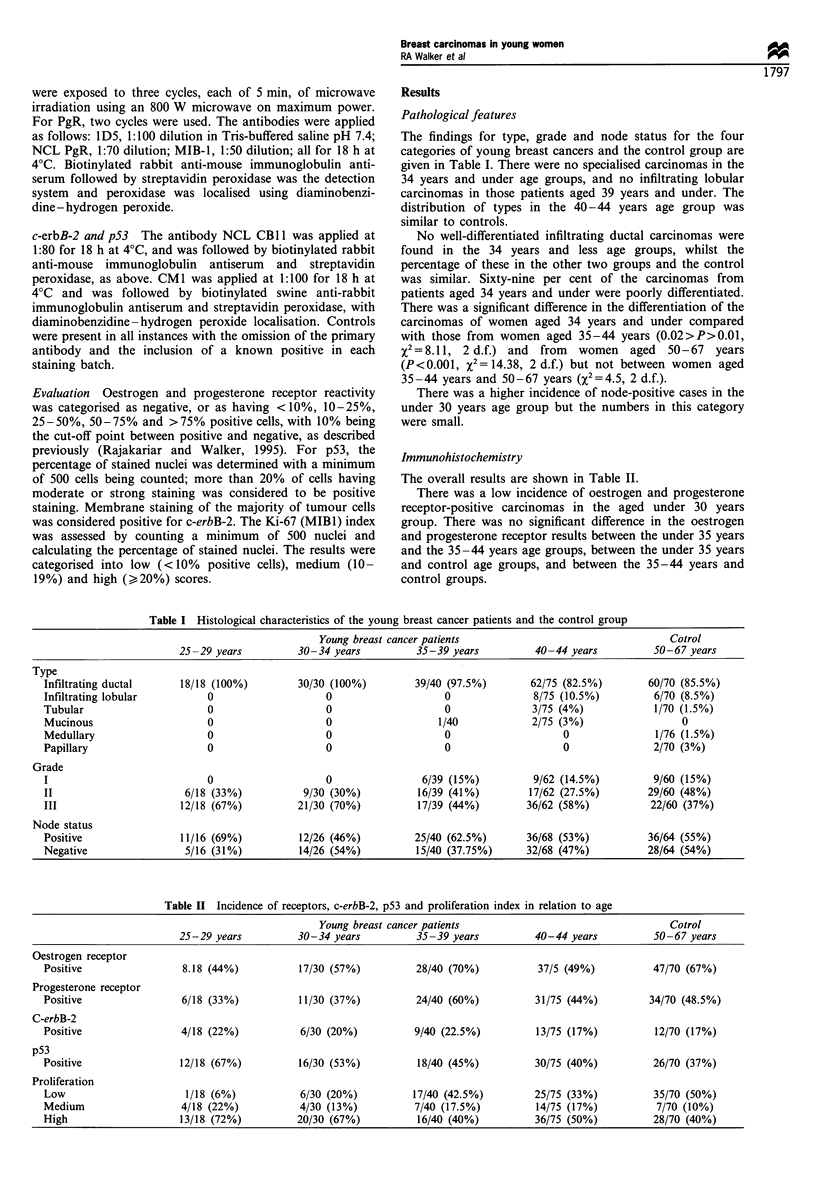
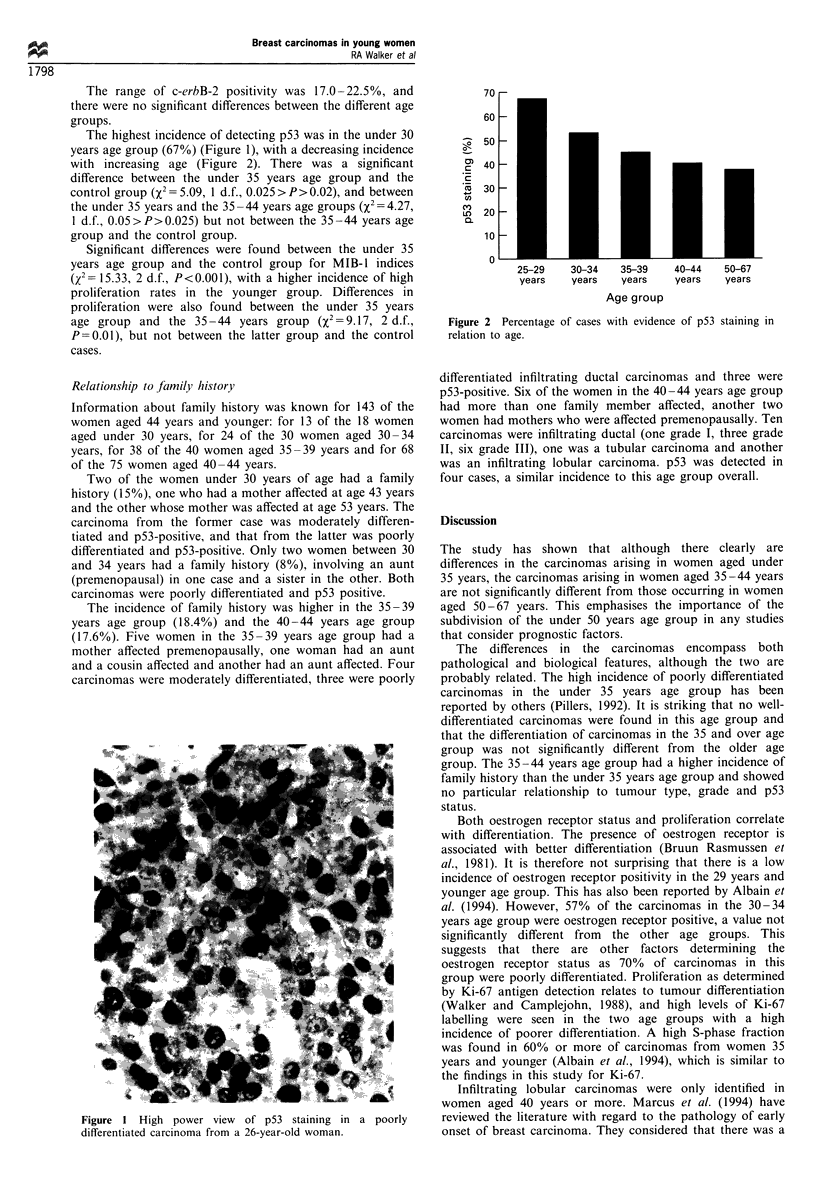
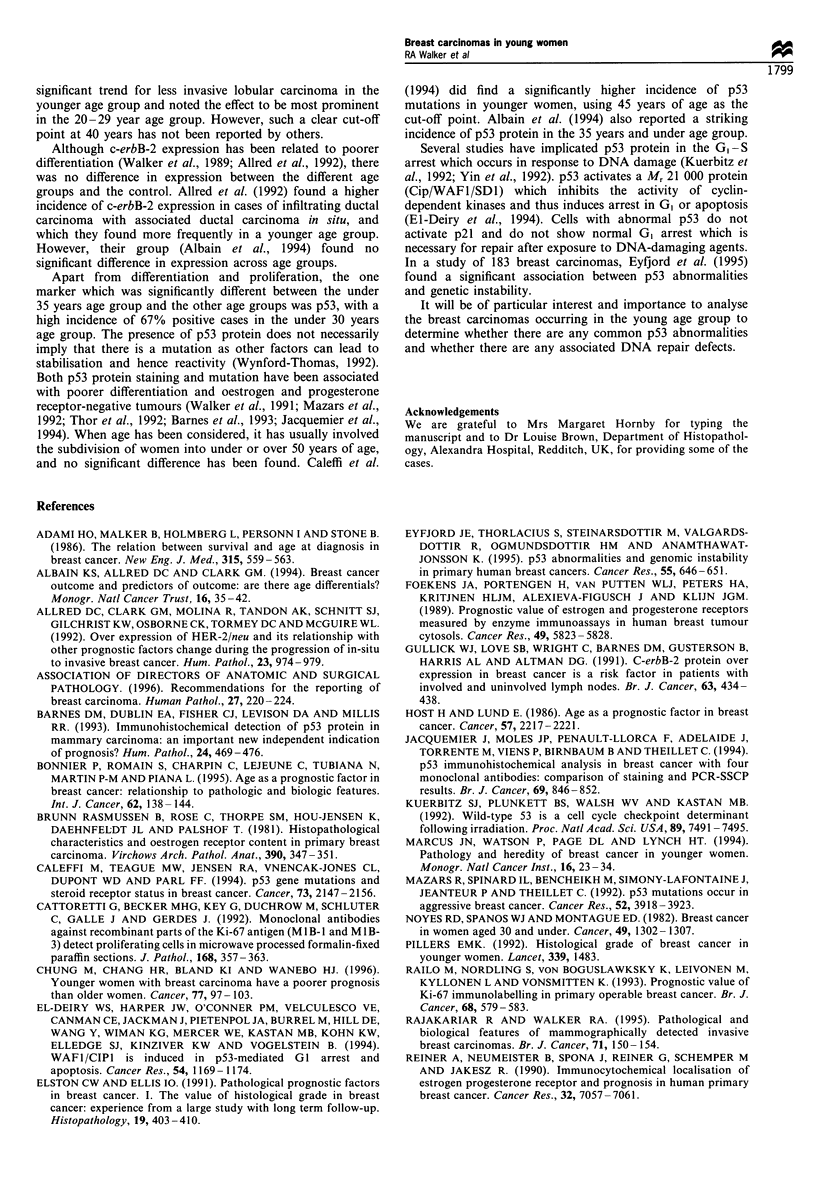
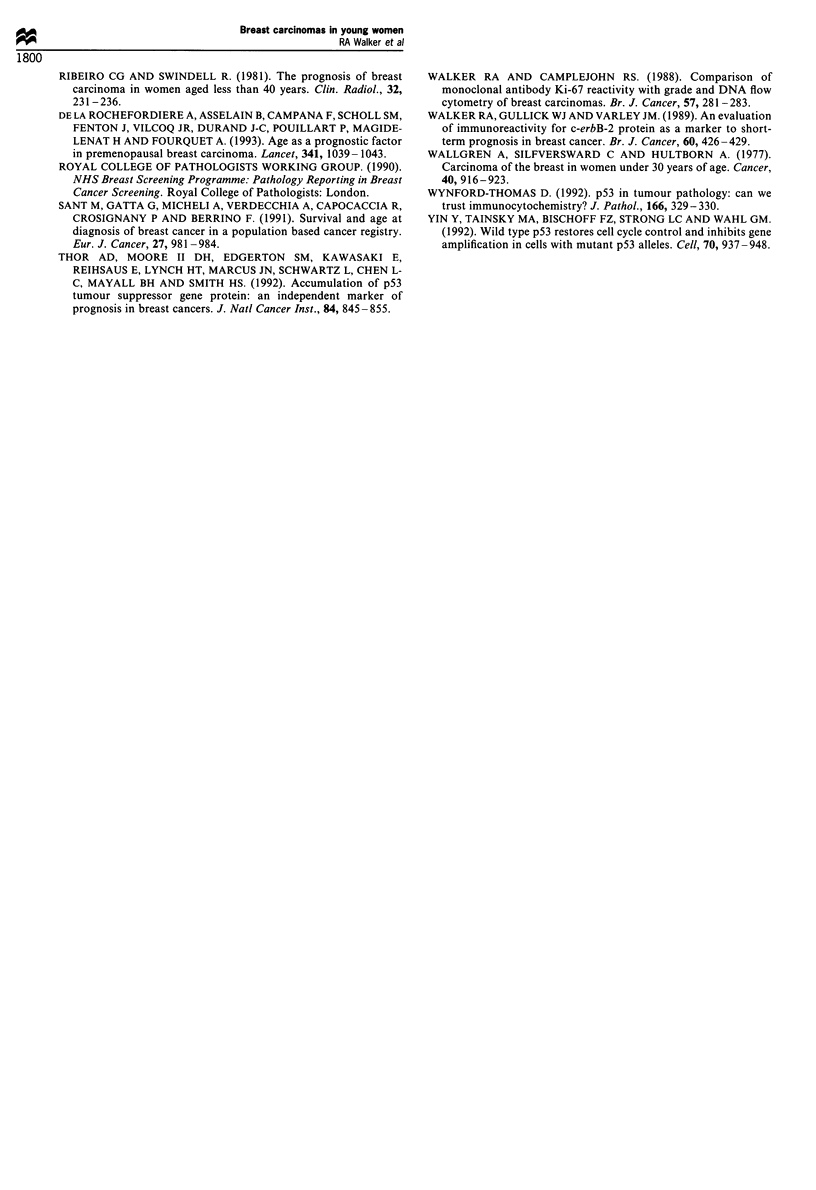
Images in this article
Selected References
These references are in PubMed. This may not be the complete list of references from this article.
- Adami H. O., Malker B., Holmberg L., Persson I., Stone B. The relation between survival and age at diagnosis in breast cancer. N Engl J Med. 1986 Aug 28;315(9):559–563. doi: 10.1056/NEJM198608283150906. [DOI] [PubMed] [Google Scholar]
- Albain K. S., Allred D. C., Clark G. M. Breast cancer outcome and predictors of outcome: are there age differentials? J Natl Cancer Inst Monogr. 1994;(16):35–42. [PubMed] [Google Scholar]
- Allred D. C., Clark G. M., Molina R., Tandon A. K., Schnitt S. J., Gilchrist K. W., Osborne C. K., Tormey D. C., McGuire W. L. Overexpression of HER-2/neu and its relationship with other prognostic factors change during the progression of in situ to invasive breast cancer. Hum Pathol. 1992 Sep;23(9):974–979. doi: 10.1016/0046-8177(92)90257-4. [DOI] [PubMed] [Google Scholar]
- Barnes D. M., Dublin E. A., Fisher C. J., Levison D. A., Millis R. R. Immunohistochemical detection of p53 protein in mammary carcinoma: an important new independent indicator of prognosis? Hum Pathol. 1993 May;24(5):469–476. doi: 10.1016/0046-8177(93)90158-d. [DOI] [PubMed] [Google Scholar]
- Bonnier P., Romain S., Charpin C., Lejeune C., Tubiana N., Martin P. M., Piana L. Age as a prognostic factor in breast cancer: relationship to pathologic and biologic features. Int J Cancer. 1995 Jul 17;62(2):138–144. doi: 10.1002/ijc.2910620205. [DOI] [PubMed] [Google Scholar]
- Caleffi M., Teague M. W., Jensen R. A., Vnencak-Jones C. L., Dupont W. D., Parl F. F. p53 gene mutations and steroid receptor status in breast cancer. Clinicopathologic correlations and prognostic assessment. Cancer. 1994 Apr 15;73(8):2147–2156. doi: 10.1002/1097-0142(19940415)73:8<2147::aid-cncr2820730820>3.0.co;2-5. [DOI] [PubMed] [Google Scholar]
- Cattoretti G., Becker M. H., Key G., Duchrow M., Schlüter C., Galle J., Gerdes J. Monoclonal antibodies against recombinant parts of the Ki-67 antigen (MIB 1 and MIB 3) detect proliferating cells in microwave-processed formalin-fixed paraffin sections. J Pathol. 1992 Dec;168(4):357–363. doi: 10.1002/path.1711680404. [DOI] [PubMed] [Google Scholar]
- Chung M., Chang H. R., Bland K. I., Wanebo H. J. Younger women with breast carcinoma have a poorer prognosis than older women. Cancer. 1996 Jan 1;77(1):97–103. doi: 10.1002/(SICI)1097-0142(19960101)77:1<97::AID-CNCR16>3.0.CO;2-3. [DOI] [PubMed] [Google Scholar]
- Elston C. W., Ellis I. O. Pathological prognostic factors in breast cancer. I. The value of histological grade in breast cancer: experience from a large study with long-term follow-up. Histopathology. 1991 Nov;19(5):403–410. doi: 10.1111/j.1365-2559.1991.tb00229.x. [DOI] [PubMed] [Google Scholar]
- Eyfjörd J. E., Thorlacius S., Steinarsdottir M., Valgardsdottir R., Ogmundsdottir H. M., Anamthawat-Jonsson K. p53 abnormalities and genomic instability in primary human breast carcinomas. Cancer Res. 1995 Feb 1;55(3):646–651. [PubMed] [Google Scholar]
- Foekens J. A., Portengen H., van Putten W. L., Peters H. A., Krijnen H. L., Alexieva-Figusch J., Klijn J. G. Prognostic value of estrogen and progesterone receptors measured by enzyme immunoassays in human breast tumor cytosols. Cancer Res. 1989 Nov 1;49(21):5823–5828. [PubMed] [Google Scholar]
- Gullick W. J., Love S. B., Wright C., Barnes D. M., Gusterson B., Harris A. L., Altman D. G. c-erbB-2 protein overexpression in breast cancer is a risk factor in patients with involved and uninvolved lymph nodes. Br J Cancer. 1991 Mar;63(3):434–438. doi: 10.1038/bjc.1991.100. [DOI] [PMC free article] [PubMed] [Google Scholar]
- Høst H., Lund E. Age as a prognostic factor in breast cancer. Cancer. 1986 Jun 1;57(11):2217–2221. doi: 10.1002/1097-0142(19860601)57:11<2217::aid-cncr2820571124>3.0.co;2-t. [DOI] [PubMed] [Google Scholar]
- Jacquemier J., Molès J. P., Penault-Llorca F., Adélaide J., Torrente M., Viens P., Birnbaum D., Theillet C. p53 immunohistochemical analysis in breast cancer with four monoclonal antibodies: comparison of staining and PCR-SSCP results. Br J Cancer. 1994 May;69(5):846–852. doi: 10.1038/bjc.1994.164. [DOI] [PMC free article] [PubMed] [Google Scholar]
- Kuerbitz S. J., Plunkett B. S., Walsh W. V., Kastan M. B. Wild-type p53 is a cell cycle checkpoint determinant following irradiation. Proc Natl Acad Sci U S A. 1992 Aug 15;89(16):7491–7495. doi: 10.1073/pnas.89.16.7491. [DOI] [PMC free article] [PubMed] [Google Scholar]
- Marcus J. N., Watson P., Page D. L., Lynch H. T. Pathology and heredity of breast cancer in younger women. J Natl Cancer Inst Monogr. 1994;(16):23–34. [PubMed] [Google Scholar]
- Mazars R., Spinardi L., BenCheikh M., Simony-Lafontaine J., Jeanteur P., Theillet C. p53 mutations occur in aggressive breast cancer. Cancer Res. 1992 Jul 15;52(14):3918–3923. [PubMed] [Google Scholar]
- Noyes R. D., Spanos W. J., Jr, Montague E. D. Breast cancer in women aged 30 and under. Cancer. 1982 Mar 15;49(6):1302–1307. doi: 10.1002/1097-0142(19820315)49:6<1302::aid-cncr2820490638>3.0.co;2-0. [DOI] [PubMed] [Google Scholar]
- Pillers E. M. Histological grade of breast cancer in younger women. Lancet. 1992 Jun 13;339(8807):1483–1483. doi: 10.1016/0140-6736(92)92079-u. [DOI] [PubMed] [Google Scholar]
- Railo M., Nordling S., von Boguslawsky K., Leivonen M., Kyllönen L., von Smitten K. Prognostic value of Ki-67 immunolabelling in primary operable breast cancer. Br J Cancer. 1993 Sep;68(3):579–583. doi: 10.1038/bjc.1993.389. [DOI] [PMC free article] [PubMed] [Google Scholar]
- Rajakariar R., Walker R. A. Pathological and biological features of mammographically detected invasive breast carcinomas. Br J Cancer. 1995 Jan;71(1):150–154. doi: 10.1038/bjc.1995.31. [DOI] [PMC free article] [PubMed] [Google Scholar]
- Rasmussen B. B., Rose C., Thorpe S. M., Hou-Jensen K., Daehnfeldt J. L., Palshof T. Histopathological characteristics and oestrogen receptor content in primary breast carcinoma. Virchows Arch A Pathol Anat Histol. 1981;390(3):347–351. doi: 10.1007/BF00496564. [DOI] [PubMed] [Google Scholar]
- Reiner A., Neumeister B., Spona J., Reiner G., Schemper M., Jakesz R. Immunocytochemical localization of estrogen and progesterone receptor and prognosis in human primary breast cancer. Cancer Res. 1990 Nov 1;50(21):7057–7061. [PubMed] [Google Scholar]
- Ribeiro G. G., Swindell R. The prognosis of breast carcinoma in women aged less than 40 years. Clin Radiol. 1981 Mar;32(2):231–236. doi: 10.1016/s0009-9260(81)80168-7. [DOI] [PubMed] [Google Scholar]
- Sant M., Gatta G., Micheli A., Verdecchia A., Capocaccia R., Crosignani P., Berrino F. Survival and age at diagnosis of breast cancer in a population-based cancer registry. Eur J Cancer. 1991;27(8):981–984. doi: 10.1016/0277-5379(91)90263-d. [DOI] [PubMed] [Google Scholar]
- Thor A. D., Moore DH I. I., Edgerton S. M., Kawasaki E. S., Reihsaus E., Lynch H. T., Marcus J. N., Schwartz L., Chen L. C., Mayall B. H. Accumulation of p53 tumor suppressor gene protein: an independent marker of prognosis in breast cancers. J Natl Cancer Inst. 1992 Jun 3;84(11):845–855. doi: 10.1093/jnci/84.11.845. [DOI] [PubMed] [Google Scholar]
- Walker R. A., Camplejohn R. S. Comparison of monoclonal antibody Ki-67 reactivity with grade and DNA flow cytometry of breast carcinomas. Br J Cancer. 1988 Mar;57(3):281–283. doi: 10.1038/bjc.1988.60. [DOI] [PMC free article] [PubMed] [Google Scholar]
- Walker R. A., Gullick W. J., Varley J. M. An evaluation of immunoreactivity for c-erbB-2 protein as a marker of poor short-term prognosis in breast cancer. Br J Cancer. 1989 Sep;60(3):426–429. doi: 10.1038/bjc.1989.299. [DOI] [PMC free article] [PubMed] [Google Scholar]
- Wallgren A., Silfverswärd C., Hultborn A. Carcinoma of the breast in women under 30 years of age: a clinical and histopathological study of all cases reported as carcinoma to the Swedish Cancer Registry, 1958-1968. Cancer. 1977 Aug;40(2):916–923. doi: 10.1002/1097-0142(197708)40:2<916::aid-cncr2820400248>3.0.co;2-1. [DOI] [PubMed] [Google Scholar]
- Wynford-Thomas D. P53 in tumour pathology: can we trust immunocytochemistry? J Pathol. 1992 Apr;166(4):329–330. doi: 10.1002/path.1711660402. [DOI] [PubMed] [Google Scholar]
- Yin Y., Tainsky M. A., Bischoff F. Z., Strong L. C., Wahl G. M. Wild-type p53 restores cell cycle control and inhibits gene amplification in cells with mutant p53 alleles. Cell. 1992 Sep 18;70(6):937–948. doi: 10.1016/0092-8674(92)90244-7. [DOI] [PubMed] [Google Scholar]
- de la Rochefordiere A., Asselain B., Campana F., Scholl S. M., Fenton J., Vilcoq J. R., Durand J. C., Pouillart P., Magdelenat H., Fourquet A. Age as prognostic factor in premenopausal breast carcinoma. Lancet. 1993 Apr 24;341(8852):1039–1043. doi: 10.1016/0140-6736(93)92407-k. [DOI] [PubMed] [Google Scholar]
- el-Deiry W. S., Harper J. W., O'Connor P. M., Velculescu V. E., Canman C. E., Jackman J., Pietenpol J. A., Burrell M., Hill D. E., Wang Y. WAF1/CIP1 is induced in p53-mediated G1 arrest and apoptosis. Cancer Res. 1994 Mar 1;54(5):1169–1174. [PubMed] [Google Scholar]



